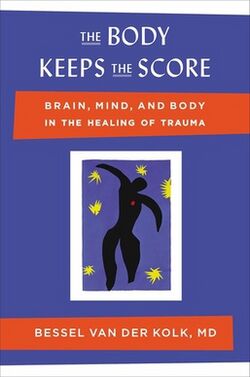Medicine:The Body Keeps the Score
 Cover featuring Henri Matisse's Icarus | |
| Author | Bessel van der Kolk |
|---|---|
| Original title | The Body Keeps the Score: Brain, Mind, and Body in the Healing of Trauma |
| Publisher | Viking Press |
Publication date | September 25, 2014 |
| Pages | 464 |
| ISBN | ISBN:978-0-670-78593-3 |
| OCLC | 861478952 |
| 616.85/21206 | |
| LC Class | RC552.P67 V358 2014 |
The Body Keeps the Score: Brain, Mind, and Body in the Healing of Trauma is a 2014 book by Bessel van der Kolk about the effects of psychological trauma, also known as traumatic stress.[1][2] The book describes van der Kolk's research and experiences on how individuals are affected by traumatic stress, and its effects on the mind and body. It is based on his 1994 Harvard Review of Psychiatry article "The body keeps the score: memory and the evolving psychobiology of posttraumatic stress".[3][4]
The Body Keeps the Score has been published in 36 languages.[5] As of July 2021 the book had spent more than 141 weeks on the New York Times Bestseller List for nonfiction, with 27 of those weeks spent in the No. 1 position.[6]
Overview
In the book, Van der Kolk discusses the effect of trauma[1] and forms of healing, including possible eye movement desensitization and reprocessing, yoga, and limbic system therapy.[7]
Reception
The Body Keeps the Score was well-received, including a starred review from Library Journal.[8] Reviewing the book for New Scientist magazine, Shaoni Bhattacharya wrote that "[p]acked with science and human stories, the book is an intense read that can get technical. Stay with it, though: van der Kolk has a lot to say, and the struggle and resilience of his patients is very moving."[2]
In 2019, The Body Keeps the Score was ranked second in the science category of The New York Times Best Seller list.[9] As of July 2021, the book had spent more than 141 weeks on the New York Times Bestseller List for nonfiction, with 27 of those weeks spent in the No. 1 position.[6]
By the end of October 2023, The Body Keeps the Score had spent 153 weeks (nearly 3 years) on Amazon’s bestseller list.[10]
In his 2005 Canadian Journal of Psychiatry article "Debunking Myths About Trauma and Memory", psychologist Richard McNally described the reasoning of Kolk's 1994 article "The Body Keeps the Score" as "mistaken", his theory as "plague[d]" by "[c]onceptual and empirical problems", and the therapeutic approach inspired by it as "arguably the most serious catastrophe to strike the mental health field since the lobotomy era".[11] McNally's 2003 book Remembering Trauma gave a detailed critique (pp. 177-82) of Kolk's article, concluding Kolk's theory was one "in search of a phenomenon".[12]
References
- ↑ 1.0 1.1 "The Body Keeps the Score by Bessel van der Kolk, M.D." (in en-US). https://www.penguinrandomhouse.com/books/313183/the-body-keeps-the-score-by-bessel-van-der-kolk-md/.
- ↑ 2.0 2.1 Bhattacharya, Shaoni (November 5, 2014). "The lifelong cost of burying our traumatic experiences". https://www.newscientist.com/article/mg22429941-200-the-lifelong-cost-of-burying-our-traumatic-experiences/. Retrieved April 2, 2023.
- ↑ Carr, Danielle (31 July 2023). "Tell Me Why It Hurts: How Bessel van der Kolk's once controversial theory of trauma became the dominant way we make sense of our lives". Intelligencer (New York: New York Media). https://nymag.com/intelligencer/article/trauma-bessel-van-der-kolk-the-body-keeps-the-score-profile.html. Retrieved 4 November 2023.
- ↑ Rodrigues, Ashwin (2 August 2023). "The Author of The Body Keeps the Score Is "Puzzled" By Its Popularity". GQ (New York: Condé Nast Inc.). https://www.gq.com/story/body-keeps-the-score-popularity. Retrieved 4 November 2023.
- ↑ "The Body Keeps The Score" (in en). https://www.besselvanderkolk.com/resources/the-body-keeps-the-score.
- ↑ 6.0 6.1 Egan, Elisabeth (July 8, 2021). "Does a Writer Ever Get Cozy on the Best-Seller List? Bessel van der Kolk Says No." (in en-US). The New York Times. ISSN 0362-4331. https://www.nytimes.com/2021/07/08/books/review/the-body-keeps-score-bessel-van-der-kolk.html.
- ↑ Interlandi, Jeneen (May 22, 2014). "A Revolutionary Approach to Treating PTSD" (in en-US). The New York Times. ISSN 0362-4331. Archived from the original. Error: If you specify
|archiveurl=, you must also specify|archivedate=. https://web.archive.org/web/20140525003351/https://www.nytimes.com/2014/05/25/magazine/a-revolutionary-approach-to-treating-ptsd.html. - ↑ "The Body Keeps the Score: Brain, Mind, and Body in the Healing of Trauma". October 1, 2014. https://bookverdict.mediasourceinc.net/details.xqy?uri=Product2014-10-01-4740159.xml.
- ↑ "Science Books - Best Sellers - The New York Times". The New York Times. September 2019. ISSN 0362-4331. https://www.nytimes.com/books/best-sellers/science/.
- ↑ "Most Sold Nonfiction | Amazon Charts". October 30, 2023. https://www.amazon.com/charts/2023-10-22/mostsold/nonfiction?ref=chrt_bk_dx_intra_nf_sd.
- ↑ McNally, Richard J (November 2005). "Debunking Myths about Trauma and Memory" (in en). The Canadian Journal of Psychiatry 50 (13): 817–822. doi:10.1177/070674370505001302. ISSN 0706-7437. https://journals.sagepub.com/doi/10.1177/070674370505001302.
- ↑ McNally, Richard (2003). Remebering Trauma. Cambridge, MA: Harvard University Press.
 |

